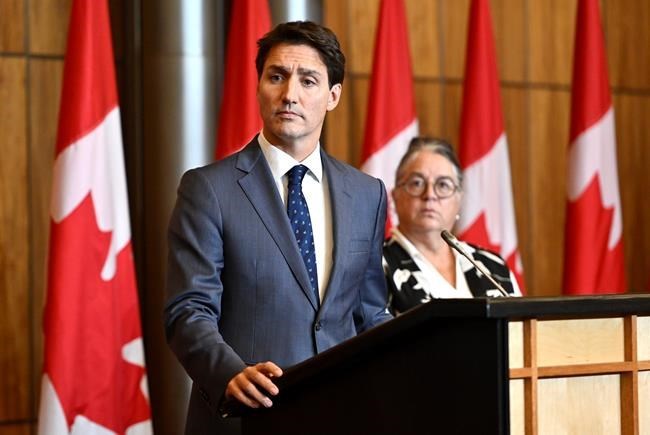
Prime Minister Justin Trudeau and Minister of National Revenue Diane Lebouthillier listen during a news conference, in Ottawa, on Saturday, Sept. 24, 2022. Trudeau acknowledges there is "significantly more to do" on the systemic barriers that confront Muslim charities.THE CANADIAN PRESS/Justin Tang
Republished December 07, 2022 - 3:34 PM
Original Publication Date December 07, 2022 - 11:01 AM
OTTAWA - Prime Minister Justin Trudeau acknowledged Wednesday there is "significantly more to do" on the systemic barriers that confront Muslim charities amid concerns from a federal watchdog that his review of the issue also faces roadblocks.
In a statement last month, taxpayers' ombudsperson François Boileau said his office was having trouble obtaining information needed from the Canada Revenue Agency to conduct his review.
Following her participation in a national summit last year on Islamophobia, Revenue Minister Diane Lebouthillier asked the ombudsperson to conduct a systemic review of the concerns of certain Muslim charities about their treatment by the revenue agency.
Lebouthillier asked the watchdog to pay particular attention to concerns about the selection of files for audit purposes by the Review and Analysis Division of the revenue agency's charities directorate.
A 2021 report by the International Civil Liberties Monitoring Group said the division works with national security agencies to carry out these audits, with little accountability or independent review.
Asked about the ombudsperson's difficulties, Trudeau said Muslim charities in Canada "have faced systemic challenges and barriers that go back many, many years — indeed, starting with actions under the previous government."
Trudeau said Lebouthillier has been "taking this extremely seriously," but noted the Canada Revenue Agency operates at arm's length from the government.
"We know there is significantly more to do and we will look at what next steps can be taken."
In his statement, Boileau said the revenue agency indicated that due to the constraints set out in the Income Tax Act, it could not share certain parts of a charity's file, even with the charity's consent.
It is the revenue agency's current practice not to disclose certain information, particularly with regard to risk assessment when selecting a charity for audit purposes, he added.
"However, these seem to be crucial elements for us to be able to properly answer the questions submitted, particularly the question concerning the criteria for selecting files for audit purposes."
Chris MacMillan, a spokesman for the minister's office, said Lebouthillier expects the taxpayers' ombudsperson and the revenue agency "to co-operate fully with each other in this study.”
In a statement, the revenue agency said Wednesday it has been supporting the examination since August 2021 through efforts including explanations of the charities directorate's policies and procedures that inform its risk assessments and audit selection.
The agency said it has also provided taxpayer information to the ombudsperson where that information is identified by the Income Tax Act as being publicly available, which includes copies of letters sent by the CRA explaining its reasons to revoke a charity, as well as confidential taxpayer information in cases where the ombudsperson has obtained authorization.
"We continue to support the important work of the Taxpayers’ Ombudsperson and are providing, to the fullest extent possible, without compromising taxpayer confidentiality or the integrity of our audit programs and national security processes, information that is requested by the (ombudsperson) in order to conduct its examination."
This report by The Canadian Press was first published Dec. 7, 2022.
News from © The Canadian Press, 2022